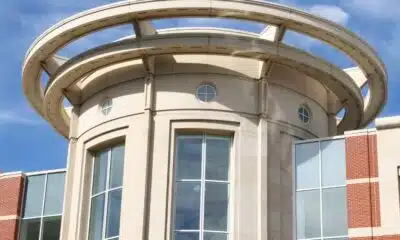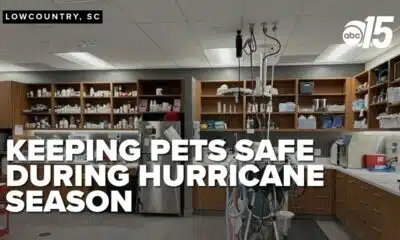News from the South - Tennessee News Feed
A prophetic perspective on Tennessee and Memphis • Tennessee Lookout
The state of our society: A prophetic perspective on Tennessee and Memphis
by Rev. Earle Fisher, Tennessee Lookout
February 9, 2025
If we say we are without sin, we deceive ourselves. The political and social realities in Tennessee — and particularly in Memphis and Shelby County — are riddled with inequities that elected officials refuse to name. Public statements from those in power often evade accountability, trading in optimism rather than truth. As a Black faith leader and community advocate, I don’t have that luxury.
For centuries, “State of the…” addresses have been moments where leaders inform the public, outline policies, and provide hope. But today, they are political spectacles — staged performances meant more to entrench power than to educate. In an era of manipulated algorithms and AI-driven disinformation, the danger of leaving the public misinformed is more pressing than ever. The societal and cultural ills we face — racism, fascism, white Christian nationalism, threats from President Donald Trump and the death of intellectualism — require truth-telling that no elected official seems willing, ready, or able to offer. As Dr. Martin Luther King Jr. reminded us, “There comes a time when silence is betrayal.” That time is now.
The perils we face in Tennessee and Memphis
The state of our society is perilous. In Memphis and Shelby County, unchecked power, systemic neglect, and political cowardice define the landscape.
Policing in Memphis remains brutal and unjust. The U.S. Department of Justice’s report on the Memphis Police Department confirmed what many already knew — racial profiling, excessive force, and unconstitutional surveillance are not isolated incidents but ingrained practices.
Yet, despite these findings, leaders refuse to embrace real reforms. Gov. Bill Lee and state legislators have done nothing to address systemic abuses. Instead of investing in community-based safety initiatives, they continue to prioritize over-policing and mass incarceration.
Local leadership is just as ineffective. Mayor Paul Young and the Memphis City Council have not fully committed to meaningful transformation. Symbolic gestures are offered, but the same policies that led to the murder of Tyre Nichols in 2023 persist.
Economic disparities in Tennessee are deepening. Memphis remains one of the poorest metropolitan areas in the nation, with nearly one in four residents living in poverty. While developers and business elites secure multimillion-dollar incentives, everyday workers struggle to afford housing, health care, and basic necessities.
Lee’s administration has done little to alleviate these burdens, rejecting federal funding for essential services while keeping the minimum wage stagnant at $7.25 an hour. Meanwhile, Memphis and Shelby County leaders operate in austerity for public resources but in abundance for corporate handouts, funneling millions in tax breaks to developers who contribute nothing to the communities they displace.
Public education in Tennessee is under siege. The state legislature aggressively pursues privatization, diverting public funds to private and charter schools while weakening oversight.
Memphis and Shelby County are prime targets, as majority-Black school districts are first to be dismantled under the guise of “school choice,” and a limited school voucher plan that passed in 2019 only applied to Shelby and Davidson Counties.
Lee and state officials push vouchers and charter expansion, harming Black and low-income students while the instability within the Memphis-Shelby County School Board creates opportunities for state intervention. The goal is clear: weaken public education, siphon funds to corporate interests, and render Black children intellectually and culturally vulnerable. If our children are not taught their own history and denied critical thinking skills, their futures are predetermined.
A path forward rooted in truth and justice
In moments like these, I am reminded of the four lepers in 2 Kings 7. Facing death and desperation, they chose to move forward in audacious resistance rather than succumb to despair. Their courage led to unexpected deliverance — a lesson for us all.
We, too, must move forward with revolutionary audacity, even amid anxieties and uncertainties. This means calling out the lies and half-truths that dominate political speeches. It means telling our own truths — unapologetically and unrelentingly. The truth is that fealty to Trump is not just a political ideology; it is a spiritual sickness that has spread into every corner of our society, including Tennessee.
Racism and fascism are not relics of the past; they are shaping our present and threatening our future. White Christian nationalism is not about faith; it is about fear — fear of a world where Black people are no longer subjugated, fear of a justice that holds the powerful accountable and fear of a truth that cannot be silenced.
Our response must be prophetic. We must confront rogue policing with demands for systemic reform. We must counter economic exploitation by organizing for fair wages and policies that prioritize people over profits. We must resist the privatization of education by advocating for schools that empower rather than exploit.
A vision for collective liberation
Tennessee and Memphis demand a response, and that response must begin with us. It must start in our churches, our community organizations, our grassroots movements, and even at our kitchen tables. We must reject the empty rhetoric of political performances that offer hope without action, promises without plans, and rhetoric without resolve. Instead, we must organize, strategize, and mobilize. We must speak the truths that others are afraid to utter. We must build power—not just for survival, but for liberation.
As the four lepers showed us, it is better to risk the unknown than to accept the unacceptable. The state of Tennessee may be perilous, but it is not beyond redemption. If we move forward with courage, conviction and community, we can transform this moment of despair into a movement of deliverance. And that is a state of the culture worth fighting for.
GET THE MORNING HEADLINES.
Tennessee Lookout is part of States Newsroom, a nonprofit news network supported by grants and a coalition of donors as a 501c(3) public charity. Tennessee Lookout maintains editorial independence. Contact Editor Holly McCall for questions: info@tennesseelookout.com.
News from the South - Tennessee News Feed
"The chances of finding him were very slim": Lost man, dog found in nick of time in West TN
SUMMARY: Troy Roper, 63, was rescued after nearly two days lost in a snake-infested swamp in Haywood County, Tennessee, while searching for his missing dog, Baxter. Roper, who has diabetes, was found weak and dehydrated, needing urgent medical care after becoming disoriented close to home. Emergency crews from multiple agencies conducted extensive air and ground searches, eventually locating him chest-deep in water with his dog nearby. His rescue involved specialized equipment to navigate the marshland. Both Roper and Baxter were covered in mud but unharmed. Roper was hospitalized, treated for low blood sugar and other issues, then released safely.
The post "The chances of finding him were very slim": Lost man, dog found in nick of time in West TN appeared first on www.wkrn.com
News from the South - Tennessee News Feed
New national school voucher program included in ‘big, beautiful’ law, with no cap on cost
by Shauneen Miranda, Tennessee Lookout
July 12, 2025
WASHINGTON — A national private school voucher program is now law, though the school choice initiative comes with a huge caveat. States also choose — whether or not to participate.
It’s a setback for advocates who hoped to see the program — baked into the mega tax and spending cut bill President Donald Trump signed into law on July Fourth — mandated in all 50 states.
The permanent program, which starts in 2027, saw several versions between the House and Senate before getting to Trump’s desk as part of congressional Republicans’ massive reconciliation package.
Robert Enlow, president and CEO of EdChoice, touted aspects of the program, but said his organization would have preferred to see a 50-state program, rather than allowing states to opt in or decline.
“I think I’m really worried about that because this is seen as a sort of more partisan issue and as a result, what would make a governor in a blue state say, ‘Let me bring in school choice’?” said Enlow, whose nonprofit focuses on advancing school choice options.
Still, Enlow described the program as “just another step along the way of giving parents more choices.”
Who will join?
It remains to be seen which states will participate, including those with their own voucher programs already underway.
Jon Valant, a senior fellow at the nonpartisan Brookings Institution, said he’s “not clear on how states will shake out on the question of whether or not to participate.”
“I’m sure the vast majority of, really, all red states will participate in this thing, but I don’t know what’s going to happen in blue and purple states,” said Valant, who also serves as director of the think tank’s Brown Center on Education Policy.
Despite that unknown, Valant said that states “do have some incentive to participate because if they don’t, then they’re potentially losing access to some funds that they wouldn’t otherwise get.”
How the program works
The program allocates up to $1,700 in federal tax credits for individuals who donate to organizations that provide private and religious school scholarships.
There is also no cap to the cost of the program, unlike earlier versions seen in both chambers of Congress.
The scholarship funds would be available to families whose household incomes do not exceed 300 percent of their area’s median gross income.
More than 138 million people could be eligible to make use of the tax credit in 2027, according to an analysis from the Institute on Taxation and Economic Policy.
However, Carl Davis, research director of the left-leaning think tank, notes in the analysis that “most of those people will not contribute” given the necessary paperwork and vouchers’ unpopularity with the public.
A state’s program participation will be decided by its governor or “by such other individual, agency, or entity as is designated under State law to make such elections on behalf of the State with respect to Federal tax benefits,” according to the final bill text.
The GOP’s school choice push
The umbrella term “school choice” centers on alternative programs to one’s assigned public school.
The effort has sparked controversy, as opponents say these programs drain critical funds and resources from school districts, while school choice advocates describe the initiatives as necessary for parents dissatisfied with their local public schools.
Trump and congressional Republicans have made school choice a major part of their education agenda.
The program also reflects a sweeping bill that GOP Reps. Adrian Smith of Nebraska and Burgess Owens of Utah and Sen. Bill Cassidy of Louisiana reintroduced in their respective chambers earlier this year.
‘Very little quality control’
Valant, of the Brookings Institution, expressed several concerns about the program, saying “there’s very little quality control, transparency or accountability for outcomes in this program, and it’s potentially a major use of public taxpayer funds.”
He said he doesn’t see anything in the program’s text that “protects against widespread waste, fraud and abuse and from programs and schools that aren’t providing much value at all to students from continuing to get a large amount of funding.”
The program also came as Trump and his administration continue to dramatically redefine the federal role in education.
Trump’s fiscal 2026 budget request calls for $12 billion in spending cuts to the Education Department. A summary from the department said this cut “reflects an agency that is responsibly winding down.”
Billions on hold
The administration has also taken heat for its recent decision to put on hold $6.8 billion in federal funds for K-12 schools.
Sasha Pudelski, director of advocacy at AASA, The School Superintendents Association, said that a time when the administration is withholding billions of dollars in these funds for public schools, “the idea that we’re going to spend an unlimited amount of tax dollars to support private and religious schools is unthinkable, unimaginable — it’s horrific.”
“This is yet another handout to wealthy Americans who can already afford to send their children to private religious schools and at a cost that comes from tax dollars being deferred away from public education that serve the poorest and neediest students in America,” added Pudelski, whose organization helps to ensure every child has access to a high quality public education.
Tennessee Lookout is part of States Newsroom, a nonprofit news network supported by grants and a coalition of donors as a 501c(3) public charity. Tennessee Lookout maintains editorial independence. Contact Editor Holly McCall for questions: info@tennesseelookout.com.
The post New national school voucher program included in ‘big, beautiful’ law, with no cap on cost appeared first on tennesseelookout.com
Note: The following A.I. based commentary is not part of the original article, reproduced above, but is offered in the hopes that it will promote greater media literacy and critical thinking, by making any potential bias more visible to the reader –Staff Editor.
Political Bias Rating: Center-Right
This content primarily presents the national school voucher program, a policy generally supported by conservative and Republican leaders, positively but with acknowledgment of criticisms from left-leaning sources. It highlights the GOP’s emphasis on school choice and includes comments from advocates aligned with conservative education reform while also giving voice to critiques about public school funding and potential risks raised by left-leaning think tanks and education associations. The coverage strives for balance but leans center-right by framing the initiative as a step forward in parental choice, aligning with mainstream conservative education priorities.
News from the South - Tennessee News Feed
Tennessee Department of Treasury working to connect residents with missing money
SUMMARY: The State of Tennessee is distributing $193 million in unclaimed property, which includes money businesses couldn’t return to rightful owners, such as rent or utility deposits, overpaid medical bills, or unpaid wages. One notable case involved a widow receiving over a million dollars from dormant stock. Residents can check for unclaimed money easily by visiting claimittn.gov and typing their name. On July 19, Tennessee Treasury officials will assist people in Rutherford County—where $24 million is unclaimed—at the Berry Festival in Murfreesboro from 10 a.m. to 3 p.m. Claims can take as little as two weeks, with yearly portal updates on November 1.
The post Tennessee Department of Treasury working to connect residents with missing money appeared first on www.wkrn.com
-
The Center Square6 days ago
Here are the violent criminals Judge Murphy tried to block from deportation | Massachusetts
-
News from the South - Kentucky News Feed6 days ago
Woman arrested in Morgantown McDonald’s parking lot
-
News from the South - Kentucky News Feed6 days ago
Cruising into Louisville: Viking cruise ship docks downtown on Ohio River
-
News from the South - Missouri News Feed6 days ago
The six-year saga of two cannabis facility licenses
-
News from the South - Oklahoma News Feed6 days ago
Cell, no! After Two Years of Debate, Schools Get Months to Ban Phones
-
News from the South - Arkansas News Feed6 days ago
Arkansas and Oklahoma teams deploy to aid Texas floods
-
News from the South - South Carolina News Feed7 days ago
Keep your pets safe during hurricane season: experts share advice on go-bags and safe spaces
-
News from the South - North Carolina News Feed5 days ago
Learning loss after Helene in Western NC school districts













































